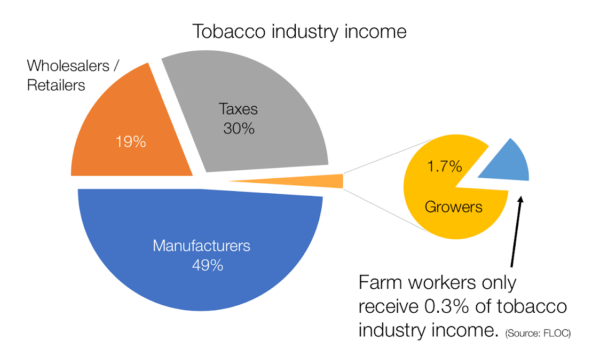Background
In the words of Cesar Chavez:
“(Farm workers) are involved in the planting and the cultivation and the harvesting of the greatest abundance of food known in this society. They bring in so much food to feed you and me and the whole country and enough food to export to other places. The ironic thing and the tragic thing is that after they make this tremendous contribution, they don’t have any money or any food left for themselves.”
Unfortunately, this paradox in our food system rings as true today as it did decades ago when Chavez spoke these words. The same farm workers who work hard to provide food to the country often struggle to make ends meet and provide food for themselves and their families. In fact, farm workers have the lowest annual family incomes of any U.S. wage and salary workers.
Take Action
Support the Fairness for Farm Workers Act (H.R.4579)! The bill would amend the Fair Labor Standards Act of 1938 to provide overtime and additional minimum wage protections for farm workers. Download the Talking Points (pdf) and Fact Sheet (pdf). Contact your legislator and either thank them for their support or ask them to support the Fairness for Farm Workers Act.
How much do farm workers earn?

Pie chart showing farm workers receive only 0.3% of the income from tobacco industry (image courtesy of FLOC)
Farm worker earnings are difficult to generalize. Many factors play into how much a farm worker is paid. The average farm worker family earns a total of $25,000 to $29,999 per year, which includes both farm labor and any other source of income. Less than ½ of farm workers have health insurance, and 20% of them live below the poverty line. However, an average number cannot describe the different factors that affect income.
Many factors such as immigration status and indigenous heritage can place workers at a particularly high risk of poverty. For instance, one survey found that the yearly income of indigenous farm workers was only about 61% of what non-indigenous workers made. Undocumented migrant farm worker families are also more than twice as likely to live below the poverty line.
The Piece Rate: Payment Based on Productivity
Many farm workers are paid based how many buckets or bags they pick of whatever crop they harvest—this is known as the “piece rate.” For instance, the piece rate for sweet potatoes in North Carolina is around 45 cents per 35 pound bucket. To be paid minimum wage, a worker must pick 635 pounds of sweet potatoes per hour.
This way of payment has significant drawbacks. It discourages breaks for water or shade, as taking breaks would cut into their productivity and cut into their pay. Additionally, it is possible for a farm worker being paid by piece rate to make less than the minimum wage, especially if growers arbitrary change how quantities of each crop are measured. Another common issue amongst farm workers is wage theft, in which a portion of a worker’s wage is stolen by their employer or supervisor.
To compensate for this problem, federal law (Fair Labor Standards Act) requires employers on large farms to pay minimum wage if a worker doesn’t earn it based on the piece rate. Unfortunately, there are loopholes to this system: about one-third of the nation’s farm workers work on small farms, and these are not subject to federal law surrounding minimum wage.
Even when regulations exist, oversight is lax. At the end of the day, a law is only as strong as its enforcement. In the case of workers in our country’s fields, labor laws are poorly enforced at best, and at worst, farm workers are paid very little or no wages and are working under modern-day slavery conditions.
Job Security & Other Issues
Other factors besides low wages also contribute to farm worker poverty. Many workers are day laborers, and migrant farm workers must chase crops to make a living. Farm workers are also constantly at the mercy of variable conditions like natural disasters and bad weather.
Finally, in addition to low wages and a lack of job security, most farm workers lack benefits that labor laws guarantee to workers in other industries. For instance, most do not receive overtime pay, nor do they get sick time or maternity leave.
Still, there is some hope for improvement: despite living in poverty and lacking enforcement of the laws that do exist, farm workers are organizing to improve these conditions. Check out our Current Campaigns to learn more about how farm workers across the country are banning together and demanding a fair wage for their hard work, and how NFWM and allies are supporting them in this struggle.
Learn more:
- Download this information (pdf)
- United Farm Workers (UFW)
- Farm Labor Organizing Committee (FLOC)
- “Compensating Farm Workers through Piece Rates: Implications on Harvest Costs and Worker Earnings” (pdf)
- National Agricultural Workers Survey (NAWS) 2019-2020
- Indigenous Farmworkers Survey

